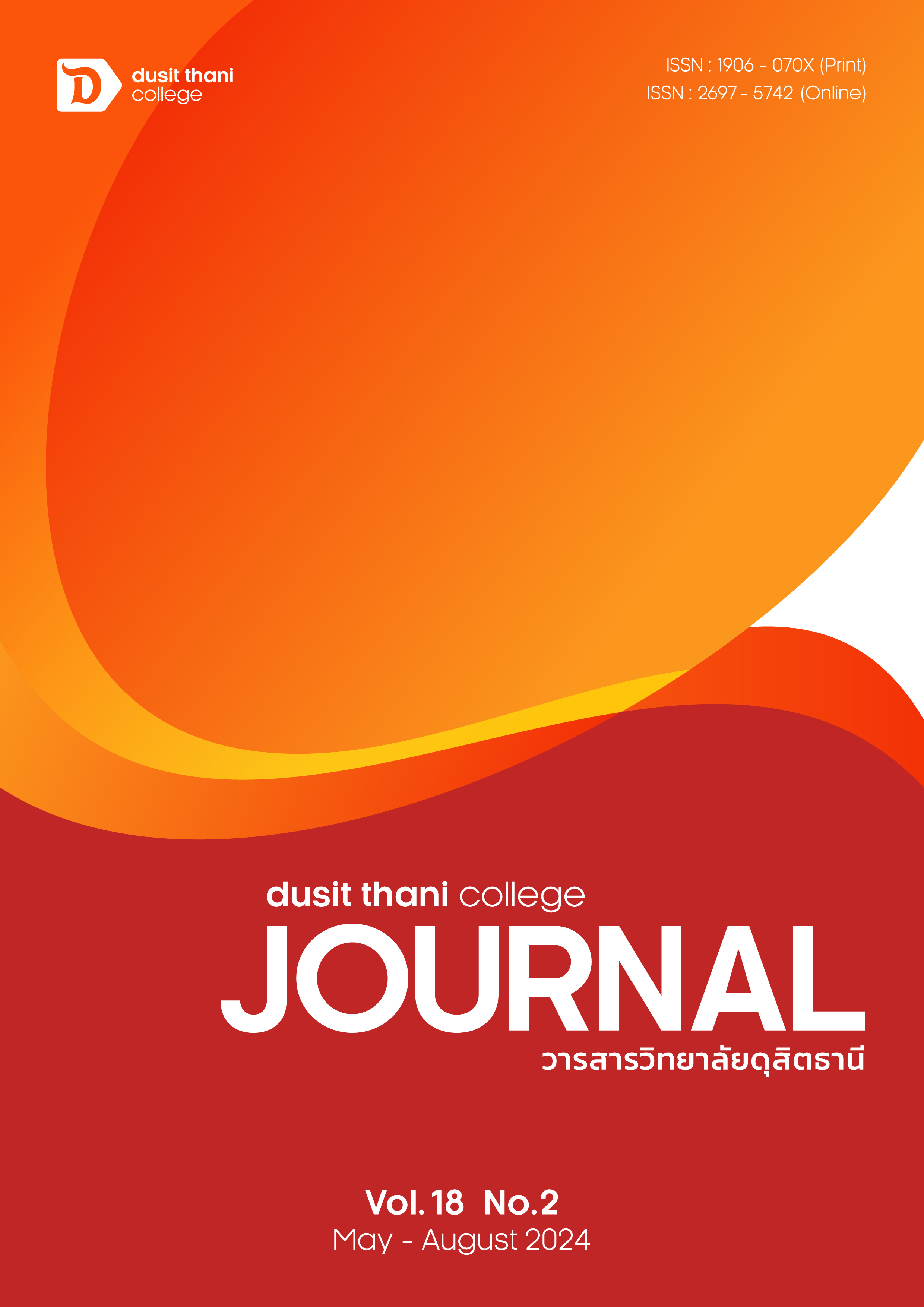The Development of Royal Thai Cuisine Standard Recipes According to Dusit Thani College Standards: A Case Study of The Savory Dishes in A Tribute to Savory and Sweet Fares
Main Article Content
Abstract
The main objective of this research was to develop the royal Thai cuisine standard recipes of savory cuisine based on the names appearing in A Tribute to Savory and Sweet Fares, composed by H. M. King Pra Bhuddha Lertla Napalai (King Rama II). Qualitative research methods were used to review literature for information related to various cuisines in A Tribute to Savory and Sweet Fares covering savory dishes. Then, standard recipes according to the standards of Dusit Thani College were developed through cooking experiments until standard recipes were obtained. The research results were presented in the form of standard recipes in 5 areas: ingredient standard, process standard, product standard, serving standard and consuming standard. The results were able to develop and present standard recipes for royal cuisine in A Tribute to Savory and Sweet Fares according to Dusit Thani College standards covering savory dishes. There were 15 recipes, namely Chicken Massaman Curry, Yum Yai (Salad), Tab Lek, Moo Naem, Koi Koong, Thepo Fish Curry, Khanom Jeen Nam Ya, Gaeng Aom, Khao Hoong, Kaeng Kua Moo Pa with Rakam, Phla Nua, La Tiang, Rhum, Rung Nok (Bird's Nest Soup), and Sang Wa. The presentation of research results included standards for ingredient proportions (recipes), cooking methods, Serving and decorating dishes, pictures of cooked food Including important notes about each food item.
Article Details

This work is licensed under a Creative Commons Attribution-NonCommercial-NoDerivatives 4.0 International License.
Article Screening Policy
- All research and academic articles to be published must be considered and screened by three peer reviews in the relevant field / article.
- All articles, texts, illustrations and tables published in the journal are the personal opinions of the authors. Editors don't always have to agree. And no responsibility whatsoever is the sole responsibility of the author.
- The articles to be published must never be published. Where did you first publish? And not in the consideration of other journals If the audit found that there has been a duplicate publication It is the sole responsibility of the author.
- Any article that the reader sees as being plagiarized or impersonated without reference. Or mislead the work of the author Please let the journal editor know it will be your greatest blessing.
References
Anantathanachai, R. et al. (2010). Development of healthy Thai food set menus based on the sufficiency economy philosophy and community context. SDU Research Journal. 3(1), 59 – 74.
Arsawi, S. (2011). The origin and development of royal food before 1932. Matichon Online. Retrieved from http://www.matichon.co.th/news_detail.php?newsid=.
Chaidarun, P. (2018). Royal Cuisine: Food of Love in Tributes to Sweet and Savory Fares. Retrieved from https://www.chiangmaicitylife.com/citylife-articles/royal-cuisineอาหารแห่งความรัก-ในกา/.
Charoenjit, P. (2017). People's ways, Thai food in literature (Part 1). Retrieve from https://www.technologychaoban.com/folkways/article_37367.
Dodgshun G. and Peters M. (2004). Cookery for the hospitality industry. 5th ed. Wallingford: Cambridge University Press.
Huanbudta, K. and Saengnim, T. (2020). Development of formulation and manufacturing process for elderly adult medical food. Faculty of Pharmaceutical Sciences, Burapha University.
Jewcharoenkul, S. (2007). Everything complete in restaurant business. Bangkok: Thanbook.
Montana Team Nutrition. (2018). Standardize Recipe. Retrieved from www.opi.mt.gov/MTeamNutrition. (2 December 2018).
Rugmai, S. et al. (2018). The development of Thai food recipes in accordance with Dusit Thani College standard: Main dishes. Dusit Thani College Journal. 12(Special), 296 – 308.
Sawasdiwat, T. (2010). Food culture in Thai society. Faculty of Arts, Mahidol University.
Sirichairojanamorakot, C., Pilachan, A. and Prempri, T. (2022). A study of Thai wisdom regarding food from Tributes to Sweet and Savory Fares. A Poem by H.M. King Phra Buddha Lertla Napalai. Research and Development Institute Journal of Chaiyaphum Rajabhat University. 4(2), 21 – 35.
Sirisoonthorn, S. (2013). Thai food culture..from the past to the present. Bangkok: WVO office of Printing Mill.
Sukprasarnsub, M. and Kangsadarnampai, K. (2009). Eat Thai food to keep away from cancer. Bangkok: Moh-Chao-Ban Publishing House.
U.S. Department of Agriculture (2002). Measuring success with standardized recipes. MS: National Food Service Management Institute.
Wattanasin, Ratiwan. (2016). Thai food culture: food consumption of central Thai people before 1955. Research report. Suandusit University.


